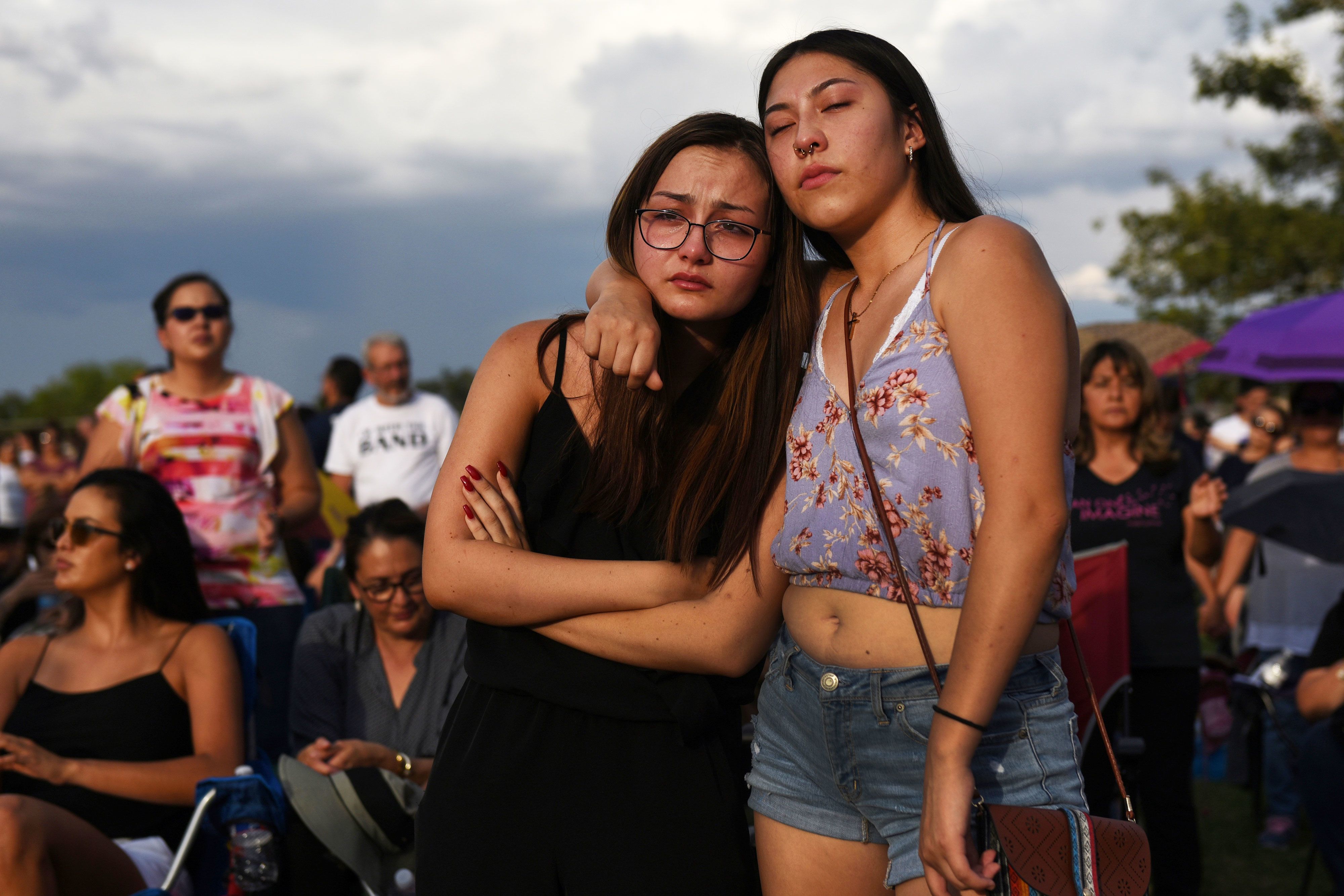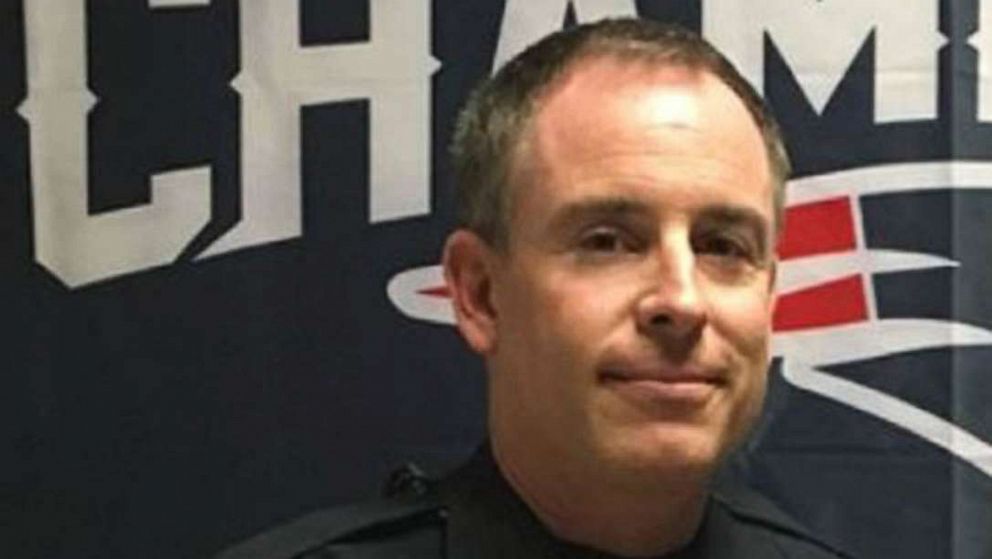
Amber Ruiz and Jazmyn Blake embrace during a vigil a day after a mass shooting at a Walmart store in El Paso, Texas, August 4, 2019.
Callaghan O’Hare | Reuters
In the wake of the weekend massacres in El Paso, Texas and Dayton, Ohio, 2020 Democratic presidential candidates are pushing proposals to curb gun violence.
Both South Bend, Indiana Mayor Pete Buttigieg and Washington Gov. Jay Inslee introduced detailed, multi-point plans Tuesday.
Buttigieg’s plan would provide $1 billion to augment law enforcement and intelligence efforts to address white nationalism and emphasizes closer monitoring of and cooperation with social media platforms to track and eliminate such groups.
Buttigieg said the U.S. must “name and shame” websites that fail to limit hate groups’ use of their services, specifically mentioning 8chan, the fringe forum where the alleged El Paso shooter and other mass shooters have posted white nationalist screeds.
He also called for implementing universal background checks, including building a national gun licensing system, implementing “red flag” laws that allow judges to seize guns from those they deem a threat to themselves or others, banning assault weapons and high-capacity magazines, closing loopholes in background check laws, and funding federal gun violence research.
Buttigieg was a high school student in 1999 when the Columbine massacre took place.
“Weapons like the one I carried in Afghanistan have no place on our streets or in our schools — least of all in the hands of white nationalists,” Buttigieg said in his proposal. “We’ve traumatized an entire generation and are set to traumatize yet another.”
Inslee’s 10-point approach
Inslee also announced a plan to address white nationalism and gun violence on Tuesday. His 10-point approach outlines steps to address the rise of white nationalism and limit access to firearms.
He harshly criticized President Donald Trump for his response to the national rise in gun violence and white nationalism.
“Combating white nationalist violence starts with a president who is willing to call out racism and put the tools of the federal government to work in tracking the scourge of extremist violence,” he states in the proposal.
His plan proposes increasing investments that will enable law enforcement to identify and prosecute white nationalist extremists and creating international alliances that will strengthen counterterrorism efforts at home.
Inslee also proposed limiting the “ease-of-access” to firearms by creating a national assault weapons ban that will apply to firearms like the AR-15 semi-automatic rifle, which was used in the Dayton shooting.
Citing the rise in hate crimes under the Trump administration, he proposed making a misdemeanor hate crime one of the list of federal prohibiting factors that would prevent a person from purchasing or owning a firearm.
The proposal suggests prosecuting those who attempt to buy a gun while ineligible, banning “ghost guns” that are untraceable, implementing “red flag” laws, and improving the Bureau of Alcohol, Tobacco, Firearms & Explosives systems so that they can conduct thorough inspections.
Inslee’s campaign declined to provide CNBC with a cost estimate for his plan.
Biden, others back gun control measures
A host of other candidates have proposed or backed various policies in the wake of the two weekend rampages.
Former Vice President Joe Biden told CNN he supports a voluntary buyback program for assault weapons, as well as universal background checks and renewing the federal assault weapons ban — which he introduced as a senator.
Sen. Bernie Sanders said on Twitter that he supports banning assault weapons. He also said that he would implement a buyback program for assault weapons and increase regulations of assault weapons to match those of fully automatic weapons.
Sen. Kamala Harris said that, as president, she would ban imports of “AR-15-style assault weapons” via executive order.
Sen. Elizabeth Warren has expressed support for legislation to address gun violence and hate crimes, and has said she would be willing to take executive action to curb gun violence as president. She also said taking back the Senate and ending the filibuster would be an important step toward curbing gun violence.
Sen. Cory Booker released a 14-point plan in May to curb gun violence, including a restrictive national gun licensing program, a ban on assault weapons and high-capacity magazines, limits on bulk gun purchases, and closing various loopholes in gun laws.
Sen. Kirsten Gillibrand said she would support a House-passed bill expanding background checks that Senate Majority Leader Mitch McConnell has blocked in the Senate. She also proposed banning assault weapons and large-capacity magazines, in addition to federal anti-gun trafficking laws.
Inslee, Warren, and Harris, along with former Rep. Beto O’Rourke, Sen. Amy Klobuchar, former Housing and Urban Development Secretary Julian Castro, and entrepreneur Andrew Yang have all pledged to attend an October presidential forum on gun violence in Las Vegas organized by March for Our Lives and the Giffords Group.
March for Our Lives is an anti-gun violence organization founded by survivors of the 2018 school shooting at Marjory Stoneman Douglas High School in Parkland, Florida. The Giffords Group is a gun reform group created by former Democratic Rep. Gabrielle Giffords who suffered a brain injury from a shot to the head during a 2011 mass shooting in Arizona.

